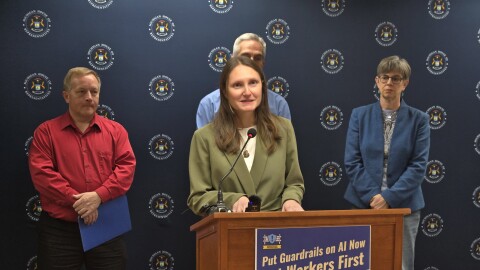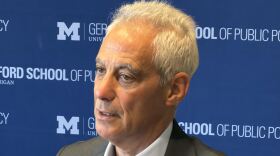-
Governor Gretchen Whitmer wants the legacy of her final year in office to include affordable housing relief.
-
Some legislators are concerned about the use of AI software to monitor employees in the workplace. The companies offering the software say it increases productivity.
-
A plan to prepare Michigan for the possibility of a federal constitutional convention got a state House committee hearing Thursday.
-
In a press conference Thursday afternoon, elected officials, faith leaders, and immigrant rights advocates voiced their concern about the U.S. Immigration and Customs Enforcement’s expansion into Michigan communities.
-
MDOT has begun the final phase of a $204 million rebuild of I-94 in Berrien County. Lane and ramp closures are expected as eastbound lanes are reconstructed.
-
Benton Harbor zoning changes approved amid debate, as one commissioner warns of displacement while the mayor says the plan expands housing and development options.
-
The legislation would outlaw knowingly giving false information regarding a donor’s social, educational, and family medical history, and ban doctors from using their own samples with patients.
-
Michigan U.S. Representative Debbie Dingell said the Trump administration’s policies are causing utility bills to rise, creating an affordability crisis for Michiganders.
-
A bipartisan group of Michigan lawmakers is introducing legislation they say would make it easier to build new homes in the state.Among other things, the bills would allow duplexes in single-family residential areas, lower the minimum size for housing units, and reduce lot size requirements for single-family homes.
-
Former Chicago Mayor, Obama Administration White House Chief of Staff, member of Congress, U.S. ambassador to Japan and possible Democratic presidential candidate Rahm Emanuel slipped into Michigan for a day, to test the waters for a presidential run — including an address Tuesday to the Detroit Economic Club.
-
The Michigan Court of Appeals says a state civil rights investigation into police misconduct in Grand Rapids can continue for as long is at needs to because it is an administrative inquiry, not a criminal matter.
-
As policymakers in Lansing debate lowering property taxes, a campaign to do away with them entirely is checking to see if it might qualify for the November ballot.
















